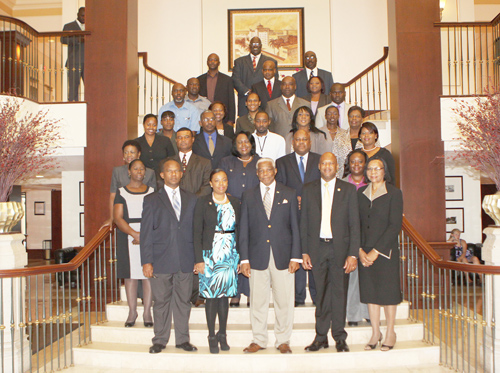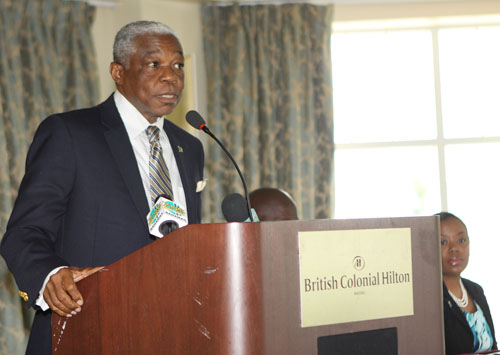From:TheBahamasWeekly.com
Government Reaffirms Commitment to Preventing Human Trafficking
By Lindsay Thompson, BIS
Sep 2, 2013 - 3:08:17 PM

Members of the National Task Force on Trafficking in Persons at the International Organisation for Migration Technical Skills Training in Human Trafficking seminar at the British Colonial Hilton on Monday, September 2, 2013. (BIS Photo/Patrick Hanna)
|
NASSAU, The Bahamas – The Commonwealth of The Bahamas has reaffirmed its commitment to the prevention of human trafficking, one of the fastest growing criminal industries in the country and worldwide.
The Minister of National Security the Hon. B. J. Nottage made the statement as he delivered the keynote address at the Opening Session of the International Organisation for Migration Technical Skills Training in Human Trafficking at the British Colonial Hilton on Monday, September 2, 2013.
The training seeks to build capacity and transfer basic technological skills to the country’s already established National Task Force on Trafficking in Persons, to enable them to obtain a greater understanding and appreciation of their role in seeking to combat trafficking in persons in all of its manifestations in the country.
The training, sponsored by the IOM, seeks to address this issue, which has in recent times been given the focused attention as the country enacted laws seeking to eradicate this form of trafficking as a steadily growing criminal activity in The Bahamas.
“This was so, primarily because successive governments have for years had to deal with the heavy burden on our country, an institution of illegal migration, that was brought on by incessant human smuggling activities.
“Human trafficking was an obscure activity with little known and little being understood, that was silently festering within our country,” Dr Nottage said

The Minister of National Security the Hon B. J. Nottage delivers the keynote address at the Opening Session of the International Organisation for Migration Technical Skills Training in Human Trafficking at the British Colonial Hilton on Monday, September 2, 2013. (BIS Photo/Patrick Hanna)
|
“Human trafficking was an obscure activity with little being known and little being understood, that was silently festering within our country,” he said. “We know that the geography of our islands and our porous borders render The Bahamas ideally suited as a transit point for illicit trafficking activities from the South destined for the North; and trafficking in persons is no exception.”
In this vein, the Government is taking proactive steps to combat the problem of trafficking in persons before it becomes ingrained in the society, Dr Nottage said.
“We are sending a clear message to the criminals who are engaged in this nefarious activity, that they will find no safe haven in The Bahamas. We will put all forces into place to root out the perpetrators of this evil crime from whatever they are, and prosecute them to the fullest extent of the law,” he said.
In moving forward, the government has partnered with the IOM to conduct a 36-month project designed to strengthen its institutional capacity to respond effectively to the crime of human trafficking.
A second training is set for October 2013 and is to be conducted primarily as a training-of trainers programme. It will prepare Task Force members to train others in their organisations on trafficking in persons.
The Bahamas is a signatory to the United Nations Convention against Transnational Organised Crime. The Convention is further supplemented by the Protocol to Prevent, Suppress and Punish Trafficking in Persons, especially Women and Children, also known as the Palermo Protocol. This Protocol is the first global legally binding instrument with a definition on trafficking in persons that is accepted internationally.
“Human trafficking is now one of the fastest growing criminal industries,” Dr Nottage said.
According to the United Nations Office on Drugs (UNODC), Global Report on Trafficking in Persons’ of 2012, 136 different nationalities were trafficked and 118 cases detected in 2012. Women account for 55 to 60 percent of the victims, with women and girls together accounting for about 75 percent. Child victims were increasing, especially girls
Trafficking for purposes of sexual exploitation accounted for 58 percent of trafficking cases globally while forced labour accounted for 36 percent. The International Labour Organisation estimates the number of victims forced into labour globally at 20.9 million persons.
“The Government of The Bahamas reaffirms its commitment to working towards the prevention of human trafficking, the prosecution of perpetrators and the protection of the victims of these heinous acts,” Dr Nottage said.
© Copyright 2013 by thebahamasweekly.com -